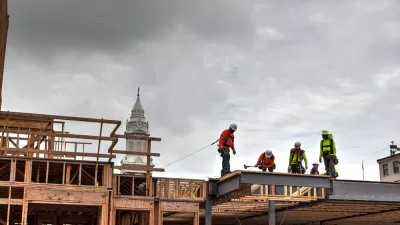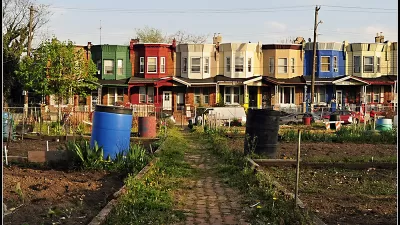Philadelphia is sweetening the deal in a proposal that would offer developers density bonuses if they send money to the city's Housing Trust Fund.

Developers told the Philadelphia City Council that a proposed density bonus law wouldn't be enough of an incentive to generate funding for affordable housing, so the City Council made revisions to the proposal.
"After a negative response from developers, Philadelphia City Council has amended the terms of a density bonus intended to raise funds for affordable housing," reports Jake Blumgart.
"The bill amended on Thursday would give developers additional height, density, and floor area in exchange for payments to the Housing Trust Fund," adds Blumgart. In essence, the density bonus is now cheaper, and thus easier, for developers to use.
The administration of Mayor Jim Kenney estimates the new density bonus would generate $18 million for the Housing Trust Fund over the next five years.
In addition to the changes already made by the city to the proposed law, the Building Industry Association (BIA) is pushing for additional changes that would "allow developers to trade a contribution to the Trust Fund for a reduction in the number of mandatory parking spaces required in high-density areas," reports Blumgart.
FULL STORY: New inclusionary zoning bill sweetens deal for developers

Manufactured Crisis: Losing the Nation’s Largest Source of Unsubsidized Affordable Housing
Manufactured housing communities have long been an affordable housing option for millions of people living in the U.S., but that affordability is disappearing rapidly. How did we get here?

Americans May Be Stuck — But Why?
Americans are moving a lot less than they once did, and that is a problem. While Yoni Applebaum, in his highly-publicized article Stuck, gets the reasons badly wrong, it's still important to ask: why are we moving so much less than before?

Using Old Oil and Gas Wells for Green Energy Storage
Penn State researchers have found that repurposing abandoned oil and gas wells for geothermal-assisted compressed-air energy storage can boost efficiency, reduce environmental risks, and support clean energy and job transitions.

Poorest NYC Neighborhoods Pay Price for Delivery Boom
The rise of ‘last-mile’ e-commerce warehouses — and their attendant truck traffic and air pollution — is disproportionately impacting the most historically disadvantaged parts of the city.

Greening Oakland’s School Grounds
With help from community partners like the Trust for Public Land, Oakland Unified School District is turning barren, asphalt-covered schoolyards into vibrant, green spaces that support outdoor learning, play, and student well-being.

California Governor Suspends CEQA Reviews for Utilities in Fire Areas
Utility restoration efforts in areas affected by the January wildfires in Los Angeles will be exempt from environmental regulations to speed up the rebuilding of essential infrastructure.
Urban Design for Planners 1: Software Tools
This six-course series explores essential urban design concepts using open source software and equips planners with the tools they need to participate fully in the urban design process.
Planning for Universal Design
Learn the tools for implementing Universal Design in planning regulations.
Heyer Gruel & Associates PA
City of Moreno Valley
Institute for Housing and Urban Development Studies (IHS)
City of Grandview
Harvard GSD Executive Education
Salt Lake City
NYU Wagner Graduate School of Public Service
City of Cambridge, Maryland





























